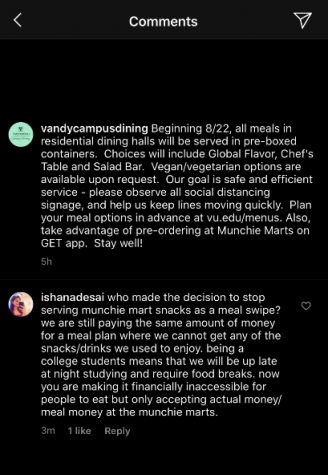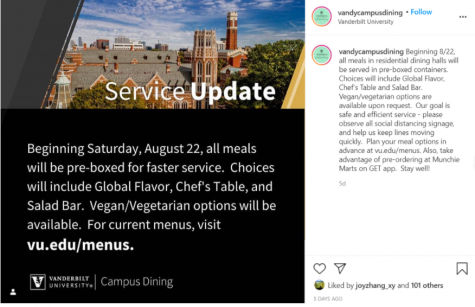UPDATE: A service update posted to the Campus Dining website on Aug. 28 announced the return of individual portions for hot entrees only. The update stated that desserts, salads and other cold menu items would still be served in pre-packaged containers. The announcement was also made at approximately 7 a.m. CDT on the @vandycampusdining Instagram.
As the first week of classes ends, students have pushed back against changes to Munchie Mart and Local Java meal swipes, as well as the transition to pre-packaged meals in residential dining halls.
As part of the Return to Campus Plan released June 16, Vanderbilt Campus Dining announced that meal plan requirements would increase for juniors and seniors living on campus. Juniors moved from a required 14 to 19 meals per week, and seniors moved from 8 to 14 meals per week, respectively.
In addition, Munchie Marts meal swipes no longer cover most snacks, and Local Java meal swipes no longer cover large specialty drinks. Meal money on the 14-meal plan increased by $75 from last year, and traditional meal swipe restrictions were lifted, allowing students to swipe up to three times in a single visit to any dining location, per an Aug. 23 Campus Dining Instagram post.
Other changes include the addition of eight new Taste of Nashville partner restaurants and three new food trucks. The Pub at Overcup Oak is no longer operational, and cafes and markets have switched to a pre-ordering system as well, per the Dining tab on the Return to Campus website. Campus Dining also announced today a new partnership with Grubhub that will allow students to use Commodore Cash on the Grubhub app.
Changed Meal Swipe Options at Local Java and Munchie Marts
Sophomore Marina Wang said her current meal plan is unnecessarily large for her needs.
“I live on Highland and have a 19 meal [plan],” Wang said. “It is quite ridiculous because we do have a kitchen and yet we are forced to purchase the expensive meal plan.”
First-year Julia Tung voiced frustration that her 21-meal plan covers more meals than the university serves each week, since dining halls commonly serve only two meals per day on the weekends.
“It’s not rational or logical for them to expect us to eat more meals than the meals they actually serve because I’m a person who doesn’t like to waste,” Tung said. “I feel bad having my parents pay the extra money when I’m not using those meals.”
Other students, including junior Navya Thakkar, said the increased requirements would be fine, were it not for changes to Munchie Marts and Local Java.
“Honestly at first when I heard about [the new meal plan requirements], I wasn’t that mad, because I have a tendency to use my swipes at Local Java to buy coffee in the afternoon to get through my afternoon slump,” Thakkar said.
Thakkar’s sentiments changed, however, when she found that Local Java no longer offered 16 oz. specialty drinks as part of the meal plan. Local Java’s meal plan now features entree items like salads and bowls, and large specialty drinks must be purchased using Meal Money or Commodore Cash.
“I was super upset about it because now I have 19 meal swipes a week and I don’t know what to do with them,” Thakkar said.
Changes to Munchie Mart meal swipes have elicited similar backlash from some students. Snacks, candy and other Munchie Mart items can no longer be purchased as part of a meal swipe. Instead, the Munchie Marts shifted to the Vandy MyPlate program, where a meal swipe translates to a cooked entree with hot sides, fresh fruit and a beverage. Snacks are available for purchase using Meal Money or Commodore Cash.
Removing snack options from the meal swipe actually forces students to go off campus to buy snacks, Thakkar said.
“It’s a health risk because people are going off-campus to supermarkets to buy more,” Thakkar said. “And I know this from personal experience because I have a stash of snacks from Trader Joe’s last week.”
Petition to Restore Previous Swipe System at Munchie Mart
Sophomore Ishana Desai started a petition on Aug. 22 to advocate for a return to the old meal swipe conditions. As of publication, the petition has over 400 signatures.
Desai said she started the petition after she and a friend commented on a Vanderbilt Dining Instagram post, criticizing the new Munchie Mart system. Comments were turned off on the post, Desai said.

“If a student is hungry but [not] wanting to get an entire meal, they can no longer order only snacks, and are now forced to either overeat by ordering an entree, or spend their money to buy ANY other options,” the petition reads in part.
The new Munchie Mart system restricts students’ food autonomy, Thakkar said.
“At some point, you have to start realizing that college students aren’t kids. They’re adults,” Thakkar said. “I know we can have unhealthy eating habits at times, but forcing people into that is never going to be helpful. You’re just turning them against campus dining.”
Despite some disappointments, Thakkar said she admired how Campus Dining had adapted their system to fit new circumstances.
“Yeah, it’s new and yeah, it’s frustrating,” Thakkar said. “But it is impressive how much they’ve done to make sure that we can still have food on campus.”
Sophomore Brandon Yang reports that, despite the expanded mobile ordering options, he was unable to find some of the staples he depended on last year.
“I was pleasantly surprised that food wasn’t actually that bad,” Yang said, “but I am disappointed that students like me (who need extra protein supplement with lactose intolerance) can’t get access to milk alternatives unless it’s a small carton of soy milk.”
Effects on Students’ Mental Health
Thakkar said the past week has also raised concerns for her about the effects of the changes on students’ mental health.
“A lot of people are really anxious to go in the dining halls now and figure out how the system works,” Thakkar said. “And I think that’s super sad because it’s important for people to feel comfortable in where they’re eating.”
For first years, who can’t remember a different version of campus dining, the changes meld into the larger transition to college life, Thakkar said, but it’s a different story for upperclassmen.
“I think a lot of upperclassmen have been avoiding the dining halls, [saying] ‘Oh, I’ll eat off campus’ or something like that because they’re not used to the system,” Thakkar said. “The GET app is kind of rough to navigate unless you have someone showing you how to do it. And Vanderbilt has resources that show how to navigate the system, but I don’t think it’s really accessible and not a lot of people know about it.”
Junior Emily Hugan said she experienced this anxiety first-hand on the weekend before classes began. Like Thakkar, Hugan moved in early for RA training and reported feeling pleasantly surprised by the quality and options of food available.
But as more students arrived on campus, Hugan noticed that lines at all locations were lengthening, and after a particularly crowded Friday evening on Aug. 21, the residential dining halls transitioned to a pre-packaged model. At places like Rand, Kissam and EBI, students now have the choice between completely separate, pre-packed meals with fewer customizable sides.

For Hugan, this change exacerbated the anxiety she was already experiencing around Campus Dining.
“I was already feeling heightened stress because dining is the biggest reminder on this campus that COVID exists,” Hugan said. “Out of any place on campus, that was the one that had the biggest restrictions, the biggest changes, [so] I was already associating the stress and loss of independence and loss of control with campus dining.”
Hugan said the stress reached a tipping point for her on Sunday, Aug. 23, when she had only two breakfast options at Rand, meat or vegan, and found she only wanted to eat one of the items in her pre-packaged meal.
“At that point, it was the tipping point of, wow, I don’t have any control over what I feed myself, I don’t have anything,” Hugan said. “That was a hard day. That was a really hard day, personally.”
Ever since that Sunday, Hugan has avoided entering dining halls as much as possible because she doesn’t want to experience that anxiety again, she said. Instead, she made an off-campus trip to pick up groceries.
“Never before in my three years at Vanderbilt have I felt like I haven’t eaten enough on campus,” Hugan said. “I just have regularly skipped meals since coming back to campus.”
Hugan said she worries about the consequences of the transition for people, particularly women, with severe eating disorders.
“This can exacerbate a lot of those anxieties for women with eating disorders because a large portion of women’s eating disorders are around the lack of control that they feel they have over their bodies and their foods,” Hugan said.
Hugan also emphasized her criticism of campus dining was directly solely at campus dining administration, not at the dining workers themselves.
“I just want to commend the dining workers,” Hugan said. “They’ve been tasked with a huge, insurmountable amount of effort and work, and I know many many of them are putting in their best effort here. A lot of them are underpaid as well and understaffed at this moment.”
In an email sent Monday, Aug. 24, Campus Dining acknowledged the problems reported over the weekend, explained the switch to pre-packaged meals and announced the addition of a $50 credit to each meal plan holder’s Commodore Cash account.
“Some of the top concerns we have heard are: unacceptably long lines and wait times, limited selection, and inconsistent meal quality,” the email read in part. “Essentially, the nationally-recognized campus dining program at Vanderbilt is not living up to our high standards and your expectations.”
Three days later, Campus Dining launched a partnership with Grubhub, allowing students to use Commodore Cash for purchases on the Grubhub app. In addition, food trucks are scheduled to arrive on campus on Monday, Sept. 7, according to the Aug. 24 email.










mike Maggart • Sep 3, 2020 at 1:55 pm CDT
I am trying to contact Emma Mattson regarding an upcoming article on Gordon Petty, MD.
Could she kindly send me her email address?